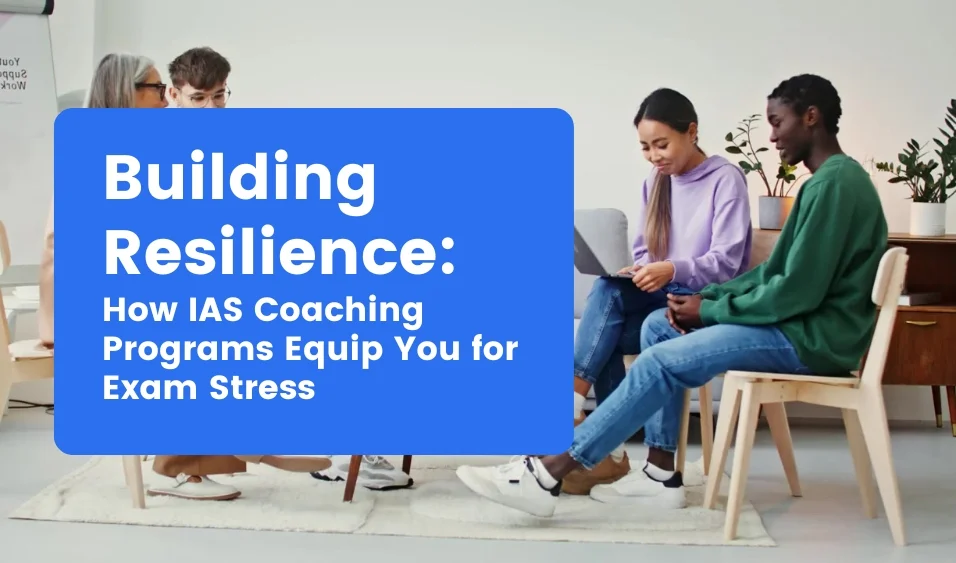How IAS Coaching Programs Equip You for Exam Stress
 September 18,2024
September 18,2024
Thousands of candidates from coaching for ias in Kolkata and disciplines fight for a small number of openings annually. Success in the UPSC CSE calls for intellectual ability and the appropriate attitude and mentality. This essay will explore the value of a good attitude and mentality in UPSC CSE preparation as well as their significant influence on an applicant's path.
Exam stress often results from pressure to succeed, fear of failure, and the sheer amount of information to acquire. It may show lower motivation, worry, and even physical symptoms such as headaches or difficulty sleeping. Timeliness of action depends on early recognition of these indicators.
Identifying Stress in Students: Strategies
A good awareness of changes in conduct, academic performance, and physical condition helps one identify pupil's stress. Under stress, students may show symptoms like impatience, withdrawal from friends or hobbies, clearly declining academic performance, or more complaints about health problems such as stomach pains or, headaches and even skin disorders. Telltale indicators can include changes in food habits, sleep patterns, and overall lack of excitement in education or school. Teachers, parents, and friends should be alert and encouraging to assist children, so feel free to share their concerns and get help.
Techniques for Helping Exam-Based Students
Helping students throughout their test seasons requires a diverse strategy that meets their emotional and intellectual demands. Teachers, parents, and individuals who interact with young people are critical in helping the young person create reasonable expectations and provide compliments for effort instead of just success, therefore relieving performance pressure.
Providing Emotional Assistance
Exam season requires emotional availability for pupils. Open communication, where kids feel heard and understood, can help them achieve this. Parents and teachers should allow children to communicate their emotions and worries, providing comfort and empathy. Establishing a support network wherein kids know they have someone to rely on helps to reduce the sense of isolation often accompanying stress.
Training teachers, parents, and mentors to provide efficient, emotional support for young people with adequate emotional support under test anxiety depends mainly on coaching methods. These methods centre on active listening, in which the coach develops to pay close attention to what the pupil is saying without instantly offering suggestions or corrections. By helping pupils feel appreciated and understood, this method builds confidence.
Moreover, open-ended questions used in coaching help students explore their emotions and ideas better, helping them express their worries and discover their own answers. This empowering coaching element changes the dynamic from reliance on outside counsel to one where the student learns resilience and problem-solving abilities, which are vital for managing stress and obstacles independently and directly applicable to getting through the test time.
Study and Editing Techniques

Another critical component is giving focused academic help. For topics students find difficult, this might involve providing tutoring, study aids, or refresher sessions. Effective study methods, including time management skills, note-taking procedures, and practice tests, help pupils be more confident and ready.
For other pupils, however, discussing these review or study strategies "go in one ear and out the other". This is generally the result of psychological obstacles to success brought on by ideas, sentiments, and behaviours the young person is usually unaware of that "block" from using these approaches to their learning. Combining tutoring with coaching, mentorship, revision or study techniques helps the young person lower their internal obstacles and assist in taking responsibility for their success.
Stress Reduction Techniques
Stress-reducing strategies include positive psychology approaches, cognitive skills, diversionary activities, and physical exercise during the school day, which can help kids have tools to control test anxiety better. Schools might consider seminars, coaching sessions, or courses imparting these abilities in the run-up to test times.
Combining a kind, sympathetic approach with helpful academic support can enable students to negotiate test time demands more effectively, promoting a better attitude towards learning and success. This is where coaching may provide all the strategies mentioned above and support the learner in acquiring confidence, drive, and accountability for their learning results.

Conclusion
Particularly during the demanding test season, the welfare of our kids is the first concern for those of us in youth work and education. Including coaching for ias in Kolkata in your student support program can help you provide the tools and assistance required for students to control test anxiety properly. Helping them through their tests is just one aspect; another is arming them with abilities and attitudes that will benefit them beyond their tests.

